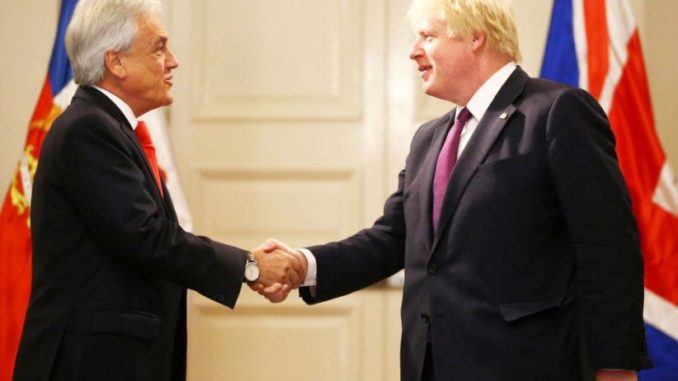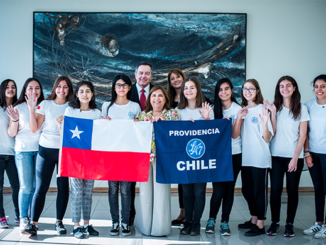
SANTIAGO – British Foreign Secretary Boris Johnson has announced that he is hoping to forge closer ties with the Pacific Alliance through trade with Chile.
The top U.K. official held talks with President Sebastian Piñera and the ministers Foreign Affairs and Economy to discuss further collaboration on international security, defense, and post-Brexit trade opportunities.
Johnson concluded a five-day charm offensive in South America on Wednesday after he extended a trip to a G20 foreign ministers’ meeting in Buenos Aires to include a tour of Peru, Argentina and Chile, seeking closer ties with all three countries.
Britain is looking to negotiate free trade agreements to sustain commerce after its departure from the European Union.
“We see a great chance to be closer to the Pacific Alliance, a group of free-trading countries,” he said at a joint news conference with Chile’s Foreign Minister Roberto Ampuero.

“There is an old, rich and historic friendship between our two outward-looking, free trade economies… We see great opportunities to develop this partnership,” Johnson said. The Pacific Alliance includes Chile, Colombia, Peru and Mexico.
Speaking to the press during an official visit to Chile’s capital city Santiago, he said that free trade was a way to bring both sides together.
Johnson also expressed his desire to begin talks with Chile about a Free Trade Agreement (FTA), a kind of agreement that involves cooperation between countries to reduce trade barriers as well as to increase trade of goods and services with each other.
A pleasure to meet Chilean President @sebastianpinera in Santiago today to talk free trade, post-Brexit business opportunities, and the crucial importance of providing girls with a proper education to help build peaceful and prosperous societies pic.twitter.com/hDh95pawgo
— Boris Johnson (@BorisJohnson) May 23, 2018
Chile has an active FTA with the European Union (EU) in force since 2005, and Britain will begin negotiations with Chile for a separate agreement when Brexit is completed.
Chile’s Foreign Minister Roberto Ampuero said that once the withdrawal of the Britain from the EU materialized, “we wish to deepen our political dialogue … to maintain, preserve and improve the conditions we have with the EU while preserving and improving those” with Britain.
The chief Chilean diplomat said that both countries were partners on free trade and that has allowed both sides to reach a new “level of prosperity and progress.”
“We have spoken about the importance of the Pacific Alliance as a very successful economic actor in Latin America. We have invited Britain to deepen its ties with the Pacific Alliance, utilizing Chile as an ideal bridge to grow closer … to Latin America,” said the Chilean official.

Founded in 2011, the Pacific Alliance is a Latin American trade bloc that gathers Mexico, Chile, Peru and Colombia. The bloc accounts for about 37 percent of Latin America’s gross domestic product.
Johnson sold a vision of a Britain poised to exploit new global opportunities while at the same time fierce debate rages within his country and his own party about how Britain will exit the EU.
Johnson expressed astonishment that no British foreign minister had visited Argentina or Chile in more than two decades or Peru for 50 years at a reception at the British Embassy in Santiago on Tuesday evening.
“Since we joined in 1973 what was then called the Common Market, perhaps subconsciously the instincts of British foreign policy have been a little too Eurocentric at the expense of our engagement with the world,” he said. “Now we are leaving the EU, there is a chance to be more global, more outward-looking, more engaged.”
Ampuero said on Wednesday Chile welcomed the chance to replicate with the UK its “very successful, mutually beneficial” free trade deal with the EU.
He added: “For us, it’s important that there is no delay…. so that we can both be beneficiaries of a free trade agreement the moment that Brexit is realized.”
Johnson had expressed hopes of “a big free trade deal” with Argentina as well.
He revealed that in his meetings with Chilean officials they discussed Venezuela, “where we share very much the perspective of Chile on the tragic events unfolding in that country”. The campaign against trading illegal wildlife was also addressed as well as agreeing that it was “vile and reprehensible that in the 21st century some countries could support and condone the use of chemical weapons”.



